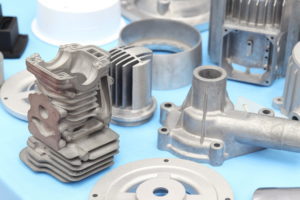Not known Details About Stahl Specialty Company
Not known Details About Stahl Specialty Company
Blog Article
The smart Trick of Stahl Specialty Company That Nobody is Talking About
Table of ContentsSome Of Stahl Specialty CompanyThe Stahl Specialty Company IdeasNot known Facts About Stahl Specialty CompanyThe 8-Minute Rule for Stahl Specialty CompanyThe Buzz on Stahl Specialty Company
The refined difference hinges on the chemical material. Chemical Contrast of Cast Light weight aluminum Alloys Silicon advertises castability by reducing the alloy's melting temperature and boosting fluidness throughout spreading. It plays a critical role in allowing elaborate molds to be filled accurately. In addition, silicon adds to the alloy's strength and put on resistance, making it useful in applications where toughness is important, such as auto components and engine parts.It additionally improves the machinability of the alloy, making it simpler to refine right into completed products. By doing this, iron adds to the total workability of light weight aluminum alloys. Copper boosts electric conductivity, making it useful in electric applications. It additionally improves corrosion resistance and adds to the alloy's total toughness.
Manganese adds to the stamina of light weight aluminum alloys and improves workability. It is typically used in functioned light weight aluminum products like sheets, extrusions, and accounts. The presence of manganese help in the alloy's formability and resistance to splitting throughout fabrication processes. Magnesium is a light-weight aspect that provides toughness and effect resistance to aluminum alloys.
It permits the manufacturing of light-weight parts with outstanding mechanical buildings. Zinc improves the castability of light weight aluminum alloys and helps control the solidification process during spreading. It boosts the alloy's stamina and firmness. It is often found in applications where intricate shapes and fine details are necessary, such as attractive spreadings and certain automobile parts.
The Best Guide To Stahl Specialty Company
Due to the fact that aluminum-silicon alloys have good casting homes, high gas residential properties, easy procedures, and outstanding corrosion resistance, aluminum-silicon alloys are most typically made use of in the die-casting sector in the house and abroad. At the very same time, aluminum-silicon alloys are also reasonably early and commonly identified alloys developed and utilized in die-casting. After continual study and improvement, the majority of the present worldwide mainstream aluminum-silicon alloys have actually been settled and are nothing even more than A356, A360, A380, ADC12, B390, and A413.
The key thermal conductivity, tensile stamina, return toughness, and prolongation vary. Amongst the above alloys, A356 has the greatest thermal conductivity, and A380 and ADC12 have the lowest.

Stahl Specialty Company - An Overview
In precision casting, 6063 is fit for applications where detailed geometries and high-grade surface finishes are paramount. Instances consist of telecommunication units, where the alloy's superior formability enables streamlined and cosmetically pleasing styles while preserving architectural stability. Similarly, in the Lights Solutions market, precision-cast 6063 parts produce elegant and efficient lighting fixtures that call for complex forms and great thermal efficiency.
(https://giphy.com/channel/stahlspecialc)
The A360 shows exceptional elongation, making it optimal for complicated and thin-walled parts. In accuracy spreading applications, A360 is appropriate for sectors such as Customer Electronic Devices, Telecommunication, and Power Tools.

In precision spreading, light weight aluminum 413 beams in the Consumer Electronics and Power Tools industries. This alloy's exceptional deterioration resistance makes it an outstanding selection for outdoor applications, making certain long-lasting, sturdy items in the mentioned industries.
Things about Stahl Specialty Company
When you have chosen that the light weight aluminum die casting procedure appropriates for your job, a crucial following action is selecting the most ideal alloy. The light weight aluminum alloy you choose will significantly impact both the spreading process and the residential properties of the last item. As a result of this, you need to make your decision meticulously and take an educated strategy.
Figuring out one of the most appropriate light weight aluminum alloy for your application will suggest considering a wide array of characteristics. These comparative alloy features adhere to the North American Die Casting Association's review guidelines, and we've split them into 2 classifications. aluminum foundry. The first category addresses alloy features that influence the production process. The 2nd covers attributes influencing the residential or commercial properties of the end product.
The alloy you choose for die spreading directly influences a number of facets of the casting process, like how simple the alloy is to work with and if it is susceptible to casting defects. Hot splitting, additionally referred to as solidification splitting, is a common die spreading defect for aluminum alloys that can cause interior or surface-level rips or cracks.
Stahl Specialty Company Things To Know Before You Buy
Particular aluminum alloys are more prone to warm cracking than others, and your option must consider this. An additional typical flaw found in the die casting of light weight aluminum is die soldering, which is when the actors adheres to the die wall surfaces and makes ejection difficult. It can damage both the cast and the die, so you ought to search for alloys with high anti-soldering residential or commercial properties.
Deterioration resistance, which is already a remarkable feature of light weight aluminum, can differ substantially from alloy to alloy and is a necessary particular to consider depending on the ecological problems your product will be subjected to. Put on resistance is an additional home frequently looked for in aluminum items and can distinguish some alloys.
Report this page